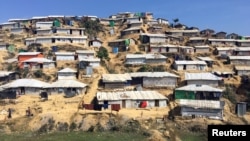U.N. agencies and the Bangladesh government have begun distributing liquid petroleum gas stoves in Cox’s Bazar to help prevent further deforestation, which has been accelerating with the huge influx of Rohingya refugees during the past year.
Cox’s Bazar is home to large areas of protected forest and an important wildlife habitat. The arrival of more than 700,000 Rohingya refugees fleeing violence and persecution in Myanmar has put enormous pressure on these precious resources.
U.N. Migration Agency spokesman, Paul Dillon tells VOA, the refugees have been cutting down the trees and clearing land to build makeshift shelters. He says they and many local villagers also rely almost exclusively on firewood to cook their meals.
“Consequently, the forests in that area are being denuded at the rate of roughly four football fields every single day. We are told by the experts at this rate, by 2019 there will be no further forests in that area,” he said.
Scientists note deforestation has devastating consequences for the environment leading to soil erosion, fewer crops, increased flooding and, most significantly, the loss of habitat for millions of species.
Dillon says disappearing forests are putting great pressure on the animals in the region.
“It interrupts migration pathways and regrettably forces these, sort of, artificial confrontations between animals in the wild and communities as they move into areas that have been logged out often-times in search of arable farmland and that type of thing,” he said.
The project aims to distribute liquid petroleum gas stoves and gas cylinders to around 250,000 families over the coming months. U.N. agencies say the stoves will have additional benefits besides helping to prevent deforestation.
For example, they note smoke from firewood burned in homes and shelters without proper ventilation causes many health problems, especially among women and children who spend much of their time indoors.




